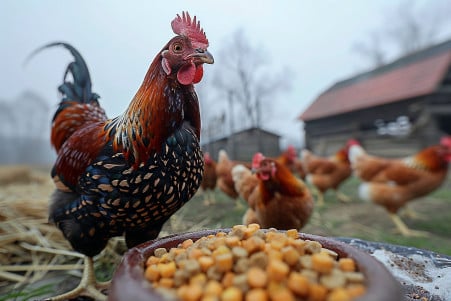Can You Eat Dog Food? The Dangers Explained
23 March 2024 • Updated 22 March 2024

Dog food is technically edible for humans in a pinch, but it’s not a good idea because it’s not nutritionally balanced and it could be contaminated. Dog food doesn’t have the right balance of nutrients that humans need, and the ratio of protein, carbohydrates, and fat isn’t right for humans. In addition, dog food may contain additives, preservatives, or even ground bone that could be harmful if consumed by humans over time.
While not necessarily toxic or immediately life-threatening, eating dog food can be harmful to your health in the long run. To shed light on this unusual option for a meal, we’ll take a look at nutritional analyses that have compared the nutritional content of dog food and human food, and we’ll also explore instances where eating dog food has led to nutritional imbalances and other issues. Knowing what could happen will help you make an informed decision if you’re ever tempted to eat dog food.
Can humans eat dog food?
Nutritional Differences: Dog Food vs. Human Food
Dog food is specially formulated to meet the distinct nutritional requirements of our canine companions, which differ significantly from human dietary needs. A study published in PMC found that commercial dog foods often contain higher levels of protein, fat, and fiber than what is recommended for humans. Conversely, dog food lacks essential nutrients like vitamin C that are crucial for human health.
The sources and processing methods used for ingredients in dog food production are markedly different from those employed in human food manufacturing. As highlighted in a Healthline article, dog food frequently contains animal byproducts like ground bones, organs, and damaged animal parts deemed unfit for human consumption. It may also include synthetic vitamins and other additives that could potentially be unsafe or even toxic when consumed by humans over an extended period.
While an occasional nibble of dog food is unlikely to cause immediate harm, regularly incorporating it into a human diet can lead to severe nutritional imbalances, deficiencies, and potentially serious health issues. The NutriFusion resource emphasizes that although human food may not be technically harmful to pets, it fails to meet their specific nutritional requirements, just as pet foods do not adequately cater to the needs of the human body. Maintaining a diet tailored to one's species is crucial for overall well-being and longevity.
Potential Dangers of Eating Dog Food
One of the most obvious dangers of eating dog food is that it can expose people to harmful bacteria such as Salmonella and Listeria, which can cause dangerous foodborne illnesses. The FDA found that raw pet food samples were more likely to be contaminated with these pathogens than other types of pet food and warned that people who feed their pets raw diets may be at increased risk of infection.
Dog food can also contain toxins, whether they are naturally occurring or the result of manufacturing issues, that can be dangerous to humans. A Live Science article points out that the FDA has issued a number of recalls and withdrawals of pet food because of contamination with substances like aflatoxins. While pet food isn’t inherently toxic, these contaminants can make it unsafe for people to eat.
In addition, eating dog food over the long term can lead to nutritional deficiencies or imbalances in people. As the Tufts University article notes, pet foods are specifically formulated to meet the needs of animals, not people, and some of the ingredients in pet food, such as synthetic vitamins or animal byproducts, can be toxic or unsafe for people to consume regularly.
Children are especially at risk of the dangers of eating dog food, including choking hazards and exposure to contaminants. It’s important to handle and prepare pet food properly to minimize the risk of illness for everyone.
Emergency Situations and Regulatory Considerations
In dire survival situations where no other food is available, eating dog food may be an unfortunate but necessary short-term option for humans. Pet food is regulated in a manner similar to human food, with rules about safety, proper production, and accurate labeling, according to the FDA. However, the FDA also specifies that pet food can't be labeled as fit for human consumption, even if it meets the same standards as human food.
The Dogster article points out that while it's technically possible to eat dog food, it's not a good dietary choice for humans and should only be eaten for as short a time as possible, with careful preparation and portion control to reduce the risks. In fact, eating dog food that's formulated to meet specific animal health needs could be considered an unapproved animal drug if it's used for humans, according to the FDA.
Although pet food is regulated, the fact that dogs and humans have different nutritional requirements means that dog food should only be considered a last resort in true emergencies. It's always best to focus on getting proper human food to ensure that you're getting the nutrients you need to stay healthy.
Expert Opinions and Recommendations
Both nutritionists and veterinarians are in agreement that dog food should not be a regular part of the human diet. According to Buzzfeed News, Melissa Majumdar, a spokesperson for the Academy of Nutrition and Dietetics, says that dog food is safe for dogs, but it is not held to the same standards as human food and therefore should not be consumed by humans. Majumdar explains that dog food often contains animal byproducts like bone meal, organs, and other ingredients that are not considered safe for human consumption.
In addition to the fact that dog food is not nutritionally balanced for humans, according to Kabo, it is not recommended as a long-term source of food for people. Instead, people should get their protein and other essential nutrients from lean meats, dairy, and plant-based foods that are safe for human consumption. As the MadPaws article points out, the "human grade" label on dog food only refers to the quality of the food's processing, not whether it is safe for humans to eat.
It is also important to handle and prepare dog food properly to avoid foodborne illness, as the FDA has cautioned. In a true emergency situation where there are no other options, experts recommend eating dog food for the shortest time possible and switching back to human food as soon as it is available, as advised by the Dogster article.
When it comes to any alternative food source, even in an emergency, human nutrition and safety should be the main concern.
Prioritizing Human Nutrition and Safety
While dog food is nutritionally balanced for dogs, it is not nutritionally balanced for humans. It is higher in fat and lower in protein than what humans need, and it is also fortified with vitamin A, which can be toxic to humans in large doses over time.
Another concern is the potential for contamination in pet food. As the BBC Science Focus Magazine article notes, the strict safety standards that apply to human food production don’t necessarily apply to pet food production, and there have been cases of contaminated pet food that could be dangerous to humans.
The PetMD article goes into more detail about the nutritional differences between dog and human food, and the FDA explains the potential for contamination in pet food due to less stringent safety standards than human food.
Conclusion: Understanding the Risks of Consuming Dog Food
While dog food may provide temporary sustenance in extreme survival situations, it is not a suitable replacement for a balanced human diet. The nutritional deficiencies, potential contaminants, and health risks associated with consuming dog food make it an unwise dietary choice for humans. Proper human food sources should always be the priority when available, as they are formulated to meet the specific nutritional needs of humans.
If faced with no other options, dog food can be consumed for a short period, but with caution and proper food safety measures. Ultimately, prioritizing human nutrition and safety should be the primary concern when considering any unconventional food sources.


